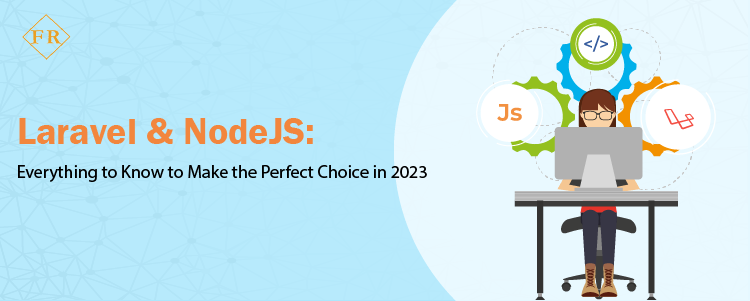Laravel & NodeJS: Everything to Know to Make the Perfect Choice in 2023
-

Ashok Kumar Singh CEO
- Trending Tech
Table of Contents
- Understanding Laravel
- Key Features of Laravel
- Advantages and Disadvantages of Laravel
- Use Cases of Laravel
- Popular Platforms Created Using Laravel
- Exploring NodeJS
- Key Features of NodeJS
- Advantages and Disadvantages of NodeJS
- Use Cases of NodeJS
- Popular Platforms Created Using NodeJS
Understanding Laravel: A Quick Overview
Laravel is an open-source PHP web framework recognised for its HTML authentication, server-side handling of routing, templating, and more. Developed by Taylor Otwell, this specific framework is crafted in PHP code and based on Symfony, which offers reusable PHP components/libraries and modern PHP applications.
As a web server-side-based framework comprising software packages, Laravel can help you develop impeccable applications with pre-defined architectures, web portals, lightweight templates, customised backend services logic, and full-stack apps. It also helps you maintain and manage SaaS products.
Laravel web development follows the Model-View-Controller (MVC) architecture while creating applications. It helps maintain the project's directory structure, uses security measures and comprises various packages like Laravel-Breeze, Laravel-Debug bar and Voyager. Dissimilar to other modern web development frameworks, it hugely simplifies database interaction. This way, it helps you use raw SQL, the Eloquent ORM, and any supported database, like MySQL or MariaDB.
Key Features of Laravel
Have a look at some of the key features of Laravel –
Model-View-Controller (MVC) Architecture
According to Laravel experts, the MVC architecture ensures the separation of presentation and business logic layers. This results in a swift Laravel web development process. The MVC design also enhances application efficiency and improves both scalability and security for developers.
Eloquent Object Relational Mapping (ORM)
This specific framework uses Eloquent, an ORM (Object Relational Mapping Framework). This enables web developers to develop database queries in PHP instead of SQL. It also amalgamates database tables and reputed programmers by allocating matching models, which results in excessively fast performance compared to older PHP frameworks.
Template Engine
Laravel comprises spectacular in-build templates that provide eye-captivating layouts. These can be customised easily, too.
These templates are extremely light in weight and can be utilised to create simple and complicated designs. Further, it effectively integrates CSS and JS code, which can offer a stable structure. Thus, you can easily get an outstanding UX/UI with seamless performance.
Built-in Packages
Countless pre-configured packages in Laravel enable you to simplify your codes and help you maintain a clean environment. Like, the Socialite package facilitates the integration of Facebook or Google Authentication into your website. This enables users to sign up in a single click.
Security
This remarkable framework tackles the security of a website internally with the aid of its built-in security system. Since it is an intermediary system that intercepts all processes and requests, it can easily stop hackers from launching harmful code remotely into your services. Further, its inbuilt CSRF token safeguards you effectively from other security threats.
Artisan
Artisan is a remarkable command-line tool that successfully automates repetitive programming tasks in the framework of Laravel. It can design a database structure, code skeleton and facilitate Laravel migration and upgrades. It can also maintain and generate original MVC files through the command line and helps manage these assets with their options.
Advantages and Disadvantages of Laravel
Now that you have become well-versed with the critical features of Laravel, let’s take a close look at certain advantages and disadvantages of the framework –
Advantages
- This MVC framework web application is incredibly easy to use. It comes adorned with countless impeccable features that can enable developers to create web applications that are faster compared to other frameworks.
- The documentation is excellent. Hence, you can learn countless things while creating your applications.
- It offers an expressive syntax for controllers, models, defining routes, and more.
- The community is excessively huge. Thus, if you have any queries or issues, you can easily find an answer on StackOverflow or one of the countless sites where Laravel users assimilate.
- Supreme quality authentication and authorisation choices.
Disadvantages
- Compared to other frameworks, Laravel offers fewer features. Thus, it falls into the category of lightweight software.
- Compared to other frameworks, it can be quite expensive. Its free versions are available but don’t incorporate all the essential features required by larger companies or teams with more complicated projects.
- The framework comes with continuous updates, which can be both good and bad. The good part is that they fix any type of security issues or bugs in less time. However, the update process can break your application, and you will need to spend considerable time fixing it up again.
Use Cases of Laravel
The use cases of Laravel web development frameworks are -
- SaaS-based web applications
- High-performance web apps
- Microservices architecture apps
- Prebuilt apps
- High-level security apps
- On-demand video streaming applications
- E-learning web apps
- Web apps with recognition and rewards features
- Multilingual CMS systems
- Stock trading-based web management systems
- Self-hosed website-performance monitoring apps
Popular and Exceptional Platforms Created Using Laravel
As the most renowned web development framework, Laravel has developed an in-demand niche for Laravel experts. Currently, businesses of different sizes depend on this MVC frameworks web application, eyes closed.
Here are some of the popular platforms that were created using Laravel –
- Alison
- InvoiceNinja
- Barchart
- CheckPeople.com
- Laracasts
- Contentoo
- Usetably
- Flarum
- Bagisto
Exploring NodeJS: A Quick Overview
According to NodeJS web development services, NodeJS is mainly a single-threaded, open-source, cross-platform runtime environment that utilises JavaScript to develop server-side applications. NodeJS code primarily runs on Microsoft Windows, Linux, and OS X. It is also created to run on the V8 JavaScript engine, an integral part of Google Chrome.
This remarkable framework can develop fast and scalable network applicants using JavaScript on both the server and client sides. It also offers an event-driven architecture that simplifies creating real-time web applications. NodeJS utilises an even loop and non-blocking I/O to tackle countless requests simultaneously, making it perfect for data-intensive real-time applications that run across many distributed services.
Further, this framework can be used to create web services. It can also be utilised to create any other network application, including desktop and mobile applications.
Key Features of NodeJS
Let’s now take a close look into some of the primary features of the NodeJS web development framework –
Event-Driven and Asynchronous
The asynchronous nature of NodeJS ensures that the web application doesn't require waiting for the API to complete an action. It calls the functions and then proceeds to the next API. Due to this, there won't be blocking of any function. Thus, you get faster performance in NodeJS applications.
NodeJS also utilises ‘Events’ as its notification system for tracking API requests to the server. Server setup in Node begins with setting variables, declaring functions, and waiting for events.
Single-Threaded
NodeJS is notably scalable; all credit goes to its single-threaded event loop architecture. Compared to traditional servers that utilise limited threads to process requests, the event mechanism of NodeJS makes it scalable and blocking-free. In comparison to its Apache HTTP server, Node utilises its single-threaded software that can tackle more requests effectively.
Cross Platform
This remarkable framework is easily compatible with Unix, Linux, Windows, Mac OS X, and mobile platforms. One can combine it with relevant packages to produce a self-sufficient executable. With the aid of Electron and NWJS, eminent professionals of web app node JS development services can build real-time, cross-platform applicants without drafting code for every platform separately.
Scalable
The applications of NodeJS are incredibly scalable due to their asynchronous operation. Thus, they are preferred by companies who want robust software development.
The framework operates on a single thread, where it starts processing a request as soon as it arrives and is prepared to access the subsequent request.
Fast Code Execution
NodeJS hugely benefits from the V8 JavaScript runtime. This wrapper offered by the framework makes the engine even faster, leading to the quick operation of the platform and offering speedy data streaming for web apps.
Quick Data Streaming
NodeJS can also process multiple data at the same time. Thus, video streaming is incredibly fast in NodeJS applications.
Advantages and Disadvantages of NodeJS
Now that you know the critical features of NodeJS, let’s take a close look at certain advantages and disadvantages of this web application framework –
Advantages
- NodeJS is an open source. Hence, it can be used free of cost on any platform you wish, like Linux, Mac OS X, and Microsoft Windows.
- It can be utilised to develop large websites that tackle thousands of concurrent connections and small applications that use only a few CPU seconds or less per request.
- The framework is hugely scalable due to its event-driven architecture.
- If one is well-acquainted with JavaScript, then one can use NodeJS. There are also countless resources online that can aid you in getting started with the Node.
- It is incredibly fast as it runs on the V8 engine of Google, which Google Chrome also uses.
Disadvantages
- The API of NodeJS frequently changes due to its open-source nature and active community of NodeJS experts, resulting in unstable API.
- The asynchronous nature of the framework makes it challenging to tackle callbacks clearly. This often results in code which is difficult to read and maintain. It also leads to something known as callback hell.
- Countless NPM registries and libraries are of incredibly low quality, insufficient and lack proper documentation. Hence, it is difficult to track this inadequate development if a certain novice creates a NodeJS application.
- There aren't adequate NodeJS experts to cater to market demands as demand surges more drastically than predicted.
Use Cases of NodeJS
The use cases of Node JS are -
- Web streaming apps
- Real-time applications
- Hugely scalable applications
- Server-side proxy
- Server-side rendering
- Complex single-page apps
- Microservices
- IoT-based applications
- Backends and typical servers
- Creating REST APIs
- Server-side rendering
- Automation and Scripting
Popular and Outstanding Platforms Created Using NodeJS
Since its launch in 2009, NodeJS has played a vital role for countless eminent market leaders. NodeJS web development services are currently used by companies of all sizes – from start-ups to Fortune 500 companies.
Have a look at some of the famous platforms that were created using NodeJS –
- Netflix
- PayPal
- GoDaddy
- Spotify
- eBay
- Airbnb
- Uber
- Trello
- Walmart
Wrapping Up,
We hope this comprehensive post focusing on the nitty-gritty of Laravel and NodeJS must have provided you with a clear perspective on which perfect backend framework to choose for your next web app.
Remember, choosing the perfect framework for your web app can be challenging. If you want to know how to choose the ideal framework based on your web application’s needs, you need to go through a head-to-head comparison of Laravel and NodeJS provided on our website.
Finally, the choice is ours. With our unmatched guidance, you can get outstanding results to bring a positive change in your company on another level.
Frequently Asked Questions
It is worth learning about Laravel in 2023. Not only is it one of the most renowned web development frameworks, but it is also constantly being updated with the latest functions and features. Its security features incorporate password storage, user authentication, encryption of data, and more. It comprises a clear coding structure with designed syntax. It enables developers to locate files faster in the application.
Additionally, with the increasing popularity of Laravel Spark and other remarkable Laravel-based products, a surge is seen in the hire of full-stack Laravel developers and web developers in India.
Laravel is a leading and renowned web development framework in 2023, making it the best choice for full-stack development. With an increased demand for Laravel experts, the demand for skilled Laravel developers has also increased significantly. Laravel is still in huge demand in 2023 as -
- It is incredibly secure
- It comes adorned with a simple code structure
- It has MVC architecture support
- It comprises object-oriented libraries
- It offers quick development time
- It is quite pocket-friendly
The perfect combination of Laravel and VueJS helps create Vue components that blend smoothly with all the blade files. The combination of both of these can also help in developing powerful SPAs that load fast and run effectively on any device. Both these frameworks utilise JavaScript as their primary language, making it incredibly easy to learn if one is already well-versed with any or both of them.
The future of NodeJS looks incredibly promising as it continues to be the most widely utilised web framework by developers globally. With renowned websites like PayPal, Netflix, and LinkedIn utilising NodeJS, it has become clear that it is the go-to choice for different real-time applications and high-traffic websites.
There exists no simple answer to this question. It completely depends on a certain number of important factors, with the inclusion of your specific requirements and preferences. Certain developers may find Laravel the best backend solution for their projects. On the other hand, some developers may opt for a different framework. Ultimately, determining which backend solution will be perfect for your project is completely up to you.
Laravel is mainly developed using PHP, a famous server-side scripting language. Again, NodeJS utilised JavaScript, which is a widely used programming language best known for its ubiquity and versatility.
Our Location




